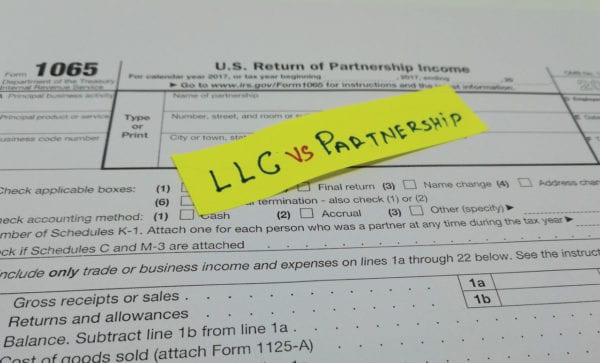Small-business owners need to understand their options, and that means taking a closer look at LLCs. Companies that use this type of legally recognized business structure find a middle ground between the simplistic setup of partnership and the complexities of establishing a full-fledged corporation.
Forming an LLC can affect the legal aspects of running your business, such as how the company handles taxation and how it manages liability. How you structure your business entity may also impact other parts of your operations, from acquiring funding to planning for the future.
LLC Definition

So, what does LLC mean? The widely used abbreviation LLC stands for limited liability company.
What Does the Limited Liability Part of LLC Mean?
The “limited liability” piece of this business structure classification reflects one of the biggest advantages of forming an LLC. A business entity established as an LLC protects the owner or owners from being held personally liable for the company.
Suppose that your company is sued or takes on too much debt and goes bankrupt. Depending on the structure of that business entity, you could either walk away with your personal finances unscathed, or your private savings could go down the drain with it. Although no small business owner ever wants their company to end this way, to protect themselves, smart entrepreneurs plan for bad outcomes (as well as good ones).
What Does it Mean to be a Company?
The last part of the phrase, “company,” establishes that the business is a legal entity separate from its owners. It also differentiates the LLC from other types of business entities, such as sole proprietorships, partnerships, and corporations. Classification as a limited liability company doesn’t necessarily express the size of the business entity.
What Is an LLC Used For?

A limited liability company is used to establish a business as its own distinct legal entity, separate from the owners who create it.
Interestingly, LLC owners—commonly referred to as “members”—aren’t always individuals. Some limited liability companies consist of one or more corporations, established LLCs, foreign business entities, or some combination of these different types of members.
Understanding LLC as a Business Structure
All business entities must have a structure to be recognized as a legal entity by the secretary of state in their state of residence as well as with the federal government. The complexity and formality of that structure vary depending on its classification.
Sole proprietorships and partnerships may require little more than a business name, a tax identification number or employer identification number (EIN), and a business registration certificate. You need much more to establish a corporation—like a board of directors, shareholders, officers, and formal, recorded meetings.
An LLC falls somewhere in between, making it a great fit for small businesses whose owners want the protection of establishing the company as a separate entity from themselves without the rigidity of a corporation. The precise process required to form an LLC varies according to state law, but it usually requires filing a legal document known as articles of organization with the secretary of state.
Although small businesses should follow several steps to form an LLC in accordance with best practices, the process of establishing your limited liability company is a lot easier than establishing a corporation.
It is also relatively easy to dissolve an LLC once you’re ready to close the doors on your business.
Types of LLCs

Under the umbrella of limited liability company classifications, small businesses can structure themselves as different kinds of LLCs. Some of the types of LLCs you may consider include:
- Single-member LLCs
- Multiple-member LLCs
- Partnership LLCs
- Member-managed LLCs
- Manager-managed LLCs
- Professional LLCs
Forming an LLC requires you to make some choices. How many members will you start out with? Who will be responsible for managing the company?
These decisions don’t have to be final, because you can always add new members or change the management structure as your company grows. However, doing so requires amending your operating agreements and state-required forms as well as paying amendment fees.
Single-Member LLC
When a limited liability company is formed by one person, it’s called a single-member LLC. Usually, an owner forms a single-member LLC for the purpose of limiting personal liability. A single-member LLC can still hire employees.
Multiple-Member LLC
A limited liability company that consists of more than one owner is sometimes called a multiple-member LLC, as opposed to a single-member LLC. Generally, an LLC can have as many members as its owners would like to include.
There are some restrictions on who can serve as a member of an LLC, such as age requirements (18 years or older) and industry limitations (most commonly, prohibiting banks and insurance companies from serving as an LLC member).
Partnership LLC
When a limited liability company is formed by at least two members, it can also be referred to as a partnership LLC. Generally, the Internal Revenue Service (IRS) considers limited liability companies belonging to two or more members to be a partnership for federal tax purposes unless they file paperwork to declare otherwise.
When an LLC is classified as a partnership for federal taxation purposes, it will typically have to file Form 1065, U.S. Return of Partnership Income.
Member-Managed LLC
Besides the number of members, limited liability companies are also classified according to their management structure. In a member-managed LLC, the owners themselves share the responsibilities of managing the operations of the company, although they may also hire employees to perform the work required to run the business.
Manager-Managed LLC
A manager-managed limited liability company is the opposite of a member-managed LLC. In this type of LLC, the owners designate specific people—within the group of LLC members or outside it—as having management duties. Other members play the more passive role of an investor.
Professional LLC
If you work in a field that requires professional licensure—for example, as a doctor, lawyer, engineer, or certified public accountant—then you may have to form a special kind of LLC called a professional limited liability company. In a professional LLC, you need to fulfill additional requirements, such as meeting licensure criteria and obtaining professional malpractice insurance.
LLC Advantages and Disadvantages

An LLC has pros and cons that pertain to setting up the business entity, paying taxes to the IRS, handling debts and liabilities, and planning for the future.
What Does an LLC Do for a Business?
Forming an LLC leads to advantages like minimizing the business owners’ personal liability and simplifying the company’s tax obligations.
Reducing Small-Business Owners’ Personal Liability
The primary reason small businesses use the LLC structure is to protect owners’ personal assets. Entrepreneurship almost always involves some degree of risk, but the debts and liabilities that owners could incur if business goes south can wipe out an individual’s savings. Establishing the LLC as a separate entity creates a layer of protection between the company’s assets and the personal assets of its members.
When your company is an LLC, rather than a partnership or a sole proprietorship that isn’t separate from you as an individual citizen, your personal assets could be fair game if your company is sued or sinks into debt. That’s not the case when you set up your company as an LLC. Like a corporation, an LLC’s status as a business that is distinct from its owners means that your personal finances are completely separate from the LLC’s assets and debts.
Allowing for Flexibility in the Company’s Structure and Operations
An LLC is a flexible business organizational structure. You don’t need the rigid job titles, board of directors, or other formal requirements that a corporation must have. That’s what makes an LLC so ideal for startups and small, growing companies.
Why spend your time, assets, and effort coordinating the complex requirements of a corporation when all you really want is to get your company set up and get down to business? The flexible nature of an LLC gives you the protection you need without the hassle involved in setting up corporations.
Keeping Taxes Simple

All business entities are supposed to pay taxes, but companies set up with different organizational structures meet this obligation in different ways. LLCs can take advantage of a pass-through tax structure, in which the company itself is not required to pay federal taxes to the IRS and instead passes that tax burden onto its owners. When the LLC’s members file their tax returns, they pay personal tax, rather than corporate tax, on the company’s income.
Along with LLCs, sole proprietorships and non-LLC partnerships may pay taxes under a pass-through structure. That’s not the case for the structures of most corporations. Typically, a corporation pays its own federal taxation as an entity, and the income paid by the corporation to its shareholders is also subject to personal tax rates. This can lead to a “double taxation” phenomenon that ends up costing you more money.
In certain instances, though, paying your LLC’s taxes as a corporation, rather than a pass-through entity, may be to your advantage. An LLC can opt to pay corporate federal tax, as opposed to being taxed as a pass-through entity, by filing Form 8832, Entity Classification Election, with the IRS. You could say this is yet another way in which LLC classification of a business entity is flexible.
Improving the Perception of Your Business
All legally recognized business structures are legitimate, but the perception of your company matters—especially to banks and potential investors. Establishing an LLC helps add an air of legitimacy to your business, compared to a partnership or a sole proprietorship, that can help you win over potential financiers.
That said, given the choice, investors may prefer to fund ventures established as a corporation over an LLC.
What Is the Downside to an LLC?

The disadvantages of an LLC structure for small businesses include having less permanent stability than corporations and not being able to sell stocks and shares like publicly traded corporations.
Less Permanency Than a Corporation
Probably the biggest drawback to forming an LLC is that this form of business structure is less permanent than a corporation. When a corporation is established, it’s expected that the business entity will go on even if one of its officers or directors leaves, dies, or files for bankruptcy in their personal financial affairs.
In an LLC, that’s not always the case, and the company may be dissolved by law under circumstances outside of your control. In certain states, even a multiple-member LLC may be required to dissolve under situations in which one member dies or has to declare bankruptcy.
Can you choose to form an LLC and keep the business running for decades? Absolutely. However, you need to be aware of what the law says about different situations as well as being proactive in writing your operating agreement. You may also be subject to annual LLC fees to keep your company in good standing.
Not Publicly Traded
If your ultimate goal is to sell stocks and shares of your company, an LLC isn’t the right choice for you—at least, not in the long run. LLCs are not publicly traded business entities, and they generally can’t sell stocks or shares.
An LLC may, however, be a stepping stone. You can start your business as an LLC for the simplicity and later convert it to a corporation once the company has grown enough to make the transition worthwhile. At that point, you may take steps to make your business a publicly traded company.
Conclusion

When you form an LLC, you’re choosing a business organizational structure that offers, in many instances, the best of both worlds. You get to blend the benefits of both a partnership and a corporation in a way that offers you more protection under the law.
There’s a lot more you should know about how to establish an LLC in different states, but learning the basics—what does LLC mean and why a small business owner should consider it—is your first step toward getting your LLC off the ground.
LLC Resources
How to Start an LLC in California
How to Start an LLC in Florida
How to Start an LLC in Texas
How to Start an LLC in New York

